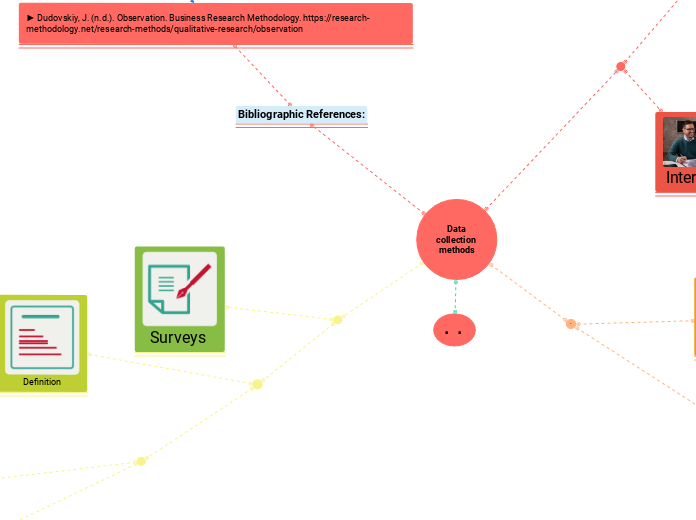Data
collection methods

Strengths
Ability to collect detailed information.
Clarify responses in real time.
Generate qualitative data through the use of open-ended questions.
In the case of structured interviews, they are:
Easy to reproduce and quantify.
Useful for reliability testing.
In the case of unstructured interviews, they are:
More flexible.
Allows questions to be adapted according to respondents' answers.

Challenges
Can take a long time.
Can be costly, especially if they require trained interviewers.
The presence of the interviewer may influence the respondent's answers.
Analysis of qualitative data from unstructured interviews can also be time-consuming.

Characteristics
It has to have a clear topic.
Have in mind the objective of the interview all along it.
It is possible to include interviewee's feelings, and experiences.
To show interest and confidentiality with the information gathered.
Definition
- The interview is a meeting between and interviewer and an interviewee.
.
- The interviews give to the researcher the chance to do it face-to-face or via web
.
.
Interviews
^



- Includes direct access to research phenomena, high levels of flexibility in terms of application and generating a permanent record of phenomena to be referred to later.
- Observation may be associated with certain ethical issues.
- Represents a longer time requirements, high levels of observer bias, and impact of observer on primary data,
Characterisitics
Observation as a data collection method can be structured or unstructured.
The researcher also participates with individuals in their activities in participant observation.
- Observation could use writing field notes, making entries into a log, or keeping a journal. Audiotapes and videotapes checklists, and rating scales.
-Can be divided into overt or covert categories.
Observation allows individuals to collect information
by viewing their actions and behaviours in their natural settings.
Observation

Strenghs
Relatively easy to administer
Can be developed in less time (compared to other data-collection methods)
Cost-effective, but cost depends on survey mode
Can be administered remotely via online, mobile devices, mail, email, kiosk, or telephone.

Challenges
Respondents may not feel encouraged to provide accurate, honest answers.
Respondents may not feel comfortable providing answers that present themselves in a unfavorable manner.
Data errors due to question non-responses may exist.
Surveys with closed-ended questions may have a lower validity rate than other question types.
Customized surveys can run the risk of containing certain types of errors

Charactics
Usage
Surveys are used to gather information about human behavior.
Systematic
Survey research follows systematic procedures.
Replicable
if you apply the same methods more than once, you will achieve similar results.
Types
Surveys use online or offline forms

Definition
A survey is the process of collecting, analysing and interpreting data from many individuals.
It aims to determine insights about a group of people.
A survey is defined as brief interviews and discussions with individuals about a specific topic.

Surveys
